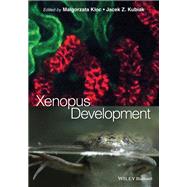Xenopus Development is divided into four sections, the first three highlight key processes in Xenopus development from embryo to metamophosis. These sections focus on the cellular processes, organogenesis and embryo development. The final section highlights novel techniques and approaches being used in Xenopus research.
Providing thorough and detailed coverage, Xenopus Development, will be a timely and welcome volume for those working in cell and molecular biology, genetics, developmental biology and biomedical research.
- Provides broad overview of the developmental biology of both Xenopus laevis and Xenopus tropicalis
- Explores cellular to systems development in key biomedical model organisms
- Timely synthesis of the field of Xenopus biology
- Highlights key biomedical and basic biological findings unlocked by Xenopus









